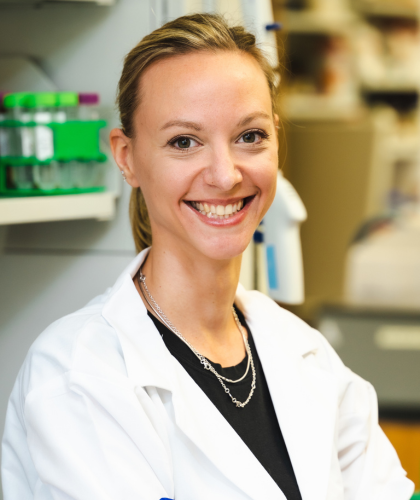BIOE Assistant Professor Receives Five-Year NIH Award to Advance Living Material Research
“This is the first grant I received as a PI,” Molinari says. “It allows us to explore new avenues and refine our research questions based on emerging findings.” Molinari’s Living Materials Design Lab focuses on developing bacterial materials that are designed from the ground up using synthetic biology. Her team works on growing these materials from scratch by programming bacteria to form specific shapes and functions. Her team aims to engineer multifunctional ELMs for transformative biomedical applications. Her research involves designing and building programmable bioengineered multicellular structures (ProBioMS) in prokaryotic (bacterial) cells. Inspired by the way natural probiotic strains form cell clusters that survive and function in specific parts of the body, ProBioMS are meant to act as therapeutic materials. They could be used in products like anticavity pastes, vaginal creams, and gastrointestinal linings that deliver live, effective treatment directly to body surfaces. A major challenge in developing ProBioMS for clinical use is controlling their size. The size of these structures influences how well they stick to tissues and how long they stay active in the body. Molinari’s lab is working to engineer cells that display self-assembling peptides on their surface, essentially allowing the cells to stick to each other in controlled ways. By adjusting the strength and density of these peptide interactions, the lab can control how large the structures become, from microscopic clusters to visible, macroscopic materials. “Probiotics you buy off the shelf usually disperse in the gut and are rarely effective,” Molinari said. “If they clump together, like in natural biofilms, they’re likely to be more locally concentrated and potentially more effective”. Molinari joined the BIOE faculty in July 2023. She completed her Ph.D. in Systems, Synthetic, and Physical Biology at Rice University, where she helped develop the world’s first de novo macroscopic living material. Her passion for research is deeply tied to her belief that science should focus on real-world problems. The MIRA award is a step toward building that vision, supporting the kind of foundational science that can lead to long-term impact.
Related Articles: May 14, 2025 Prev Next |


 Fischell Department of Bioengineering (BIOE) Assistant Professor Sara Molinari has received the
Fischell Department of Bioengineering (BIOE) Assistant Professor Sara Molinari has received the